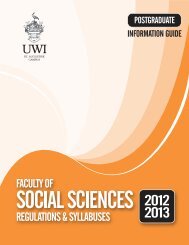Faculty of Humanities and Education (Postgraduate) - The University ...
Faculty of Humanities and Education (Postgraduate) - The University ...
Faculty of Humanities and Education (Postgraduate) - The University ...
You also want an ePaper? Increase the reach of your titles
YUMPU automatically turns print PDFs into web optimized ePapers that Google loves.
110<br />
POSTGRADUATE REGULATIONS & SYLLABUSES 2012 - 2013<br />
THE FACULTY OF HUMANITIES & EDUCATION<br />
Major competencies to be developed<br />
• Critical thinking about social relationships <strong>and</strong> networks<br />
• Practical skills for working with social networks<br />
• Sensitization to human rights, social justice, <strong>and</strong> advocacy<br />
for marginalized populations<br />
• Reflexive <strong>and</strong> critical insights into the c<strong>and</strong>idate’s<br />
own vantage point <strong>and</strong> how it might be biased (albeit<br />
inadvertently)<br />
• Ability to analyse impacts on people’s health <strong>and</strong> wellbeing<br />
using the lenses <strong>of</strong> risk, marginalization, power<br />
dynamics <strong>and</strong> gender<br />
• A capacity to use a risk assessment to plan interventions<br />
for improving community health<br />
• Capacity to analyse the causes <strong>and</strong> social <strong>and</strong> health<br />
impacts <strong>of</strong> bullying, harassment, violence, sexual assault,<br />
<strong>and</strong> hate crimes<br />
• Insights <strong>and</strong> skills to work effectively with marginalized <strong>and</strong><br />
diverse populations, <strong>and</strong> to advocate for <strong>and</strong> with them<br />
• Insights <strong>and</strong> skills to work effectively with key health issues<br />
that are traditionally marginalized (such as mental health<br />
<strong>and</strong> sexual health), <strong>and</strong> to advocate for improved services<br />
<strong>and</strong> social justice in relation to them<br />
• Underst<strong>and</strong> the health implications <strong>of</strong> other key practices<br />
that impact on public health (such as smoking, drugs,<br />
alcohol)<br />
ASSESSMENT<br />
Coursework Assignment 100%<br />
Required Reading<br />
Farmer, P. (2001) Infections <strong>and</strong> Inequalities: <strong>The</strong> Modern Plagues<br />
(Updated Edition). <strong>University</strong> <strong>of</strong> California Press. (ISBN:<br />
0520229134)<br />
Irvine, J. M. (1994). Sexual cultures <strong>and</strong> the construction <strong>of</strong><br />
adolescent identities (Health, Society, <strong>and</strong> Policy Series).<br />
Temple <strong>University</strong> Press. (ISBN: 1566391369)<br />
Klein, A., Day, M., Harriott, A. (2004). Caribbean drugs from<br />
criminalization to harm reduction. Kingston: Ian R<strong>and</strong>le<br />
Publishing. (ISBN: 976 637 194 6)<br />
Lupton, D. (1999). Risk. Routledge. (ISBN: 0415183340)<br />
Rew, L. (2004). Adolescent health: A multidisciplinary approach to<br />
theory, research, <strong>and</strong> intervention. Sage. (ISBN: 0761929118)<br />
Recommended Reading<br />
Berkman, L. F., Kawachi, I. (2000). Social epidemiology. Oxford:<br />
Oxford <strong>University</strong> Press. (ISBN: 0195083318)<br />
Rundle, A., Carvalho, M., Robinson, M. (2002). Cultural competence<br />
in health care: a practical guide. Jossey-Bass. (ISBN:<br />
078796221X)<br />
Turner, B. (2004). <strong>The</strong> New Medical Sociology: Social Forms <strong>of</strong><br />
Health <strong>and</strong> Illness. WW Norton. (ISBN: 0393975053)<br />
6.3 HEPR 6003 - Strategies, Skills, <strong>and</strong> Interventions<br />
for Promoting Health (8 credits)<br />
Course Overview<br />
This course introduces students to the concept <strong>and</strong><br />
operationalization <strong>of</strong> Health Promotion as a new approach to<br />
addressing the determinants <strong>of</strong> health. <strong>The</strong> course is aimed at<br />
enhancing participants’underst<strong>and</strong>ing, analysis <strong>and</strong> theoretical<br />
application <strong>of</strong> the behaviour change models <strong>and</strong> theories<br />
that have influenced the development <strong>of</strong> Health Promotion.<br />
Participants should gain an underst<strong>and</strong>ing <strong>of</strong> the development<br />
<strong>of</strong> Health Promotion in relation to changing health patterns;<br />
<strong>and</strong> their role in the operationalization <strong>of</strong> the strategies <strong>of</strong><br />
the Caribbean Charter for Health Promotion in addressing<br />
identified health issues impacting on individuals, families <strong>and</strong><br />
communities. Participants will also have the opportunity to<br />
critically examine <strong>and</strong> evaluate the impact <strong>of</strong>, <strong>and</strong> potential for<br />
sustainability, <strong>of</strong> health promotion interventions through onsite<br />
visits.<br />
At the end <strong>of</strong> the course, participants will be able to:<br />
• Critically examine the determinants <strong>of</strong> health <strong>and</strong> their<br />
potential impact on health <strong>and</strong> quality <strong>of</strong> life<br />
• Critically examine the development <strong>of</strong> Health Promotion in<br />
the Caribbean within historical, economic <strong>and</strong> theoretical<br />
contexts<br />
• Apply Health Behaviour Change <strong>and</strong> Health Promotion<br />
models <strong>and</strong> theories when addressing health issues <strong>of</strong><br />
individuals, families <strong>and</strong> communities.<br />
• Assess health beliefs <strong>and</strong> health behaviours<br />
• Utilize the Health Promotion approach in different<br />
settings – Healthy Communities, Healthy Schools, Healthy<br />
Workplaces<br />
• Demonstrate an underst<strong>and</strong>ing <strong>of</strong> the steps involved<br />
in developing macro-level responses including policy,<br />
strategy, <strong>and</strong> large scale campaigns<br />
• Utilize methods for advocacy, lobbying, community<br />
consultation, <strong>and</strong> creation <strong>of</strong> supportive public opinion to<br />
ensure programme viability <strong>and</strong> sustainability<br />
• Develop, Implement <strong>and</strong> evaluate Health Promotion<br />
interventions to address a current health issue<br />
• Work confidently from a social justice <strong>and</strong> human rights<br />
framework with issues that attract stigma, prejudice, <strong>and</strong><br />
discrimination<br />
CONTENT<br />
1. Operational definitions <strong>and</strong> operationalization <strong>of</strong> the<br />
following concepts:<br />
a. Health behaviour<br />
b. Health education<br />
c. Health protection<br />
d. Health Promotion<br />
2. <strong>The</strong> determinants <strong>of</strong> health<br />
a. Physical (biological)<br />
b. Social<br />
c. Environmental

















